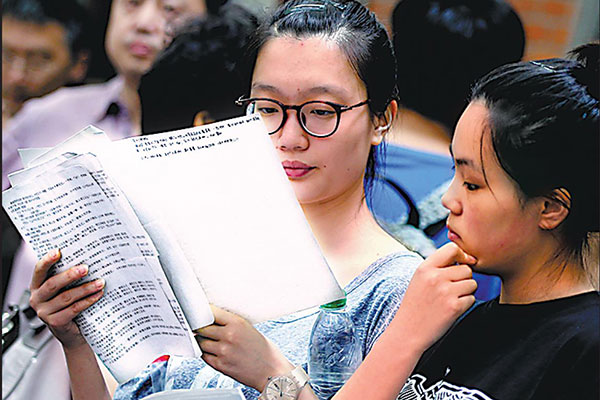
Students make their final preparations before entering the classroom for the national college entrance exam in Shanghai on June 7.[Photo/Xinhua}
All of the 9.42 million Chinese students who took the gaokao, or national college entrance exam, on June 7, know that the results will decide which domestic university they can attend.
However, in recent years, the test score can also help them gain admission to some universities overseas.
Dozens of countries and regions, including Australia, Italy and the United States, have used gaokao test scores for admission criteria.
“What we are willing to do, and have already started taking action on, is to urge overseas universities to recognize gaokao test scores,” Yu Jihai, deputy director of the International Cooperation and Exchange department of the Ministry of Education, said last month.
In May, the University of San Francisco announced that it would admit Chinese students on the basis of their gaokao test scores and a one-on-one interview without other admission requirements. This means Chinese students will have opportunities to study in the US “immediately-without spending an extra year preparing for IELTS, Toefl or SAT tests,” said Paul Fitzgerald, president of the university.
“Many studies have shown that the SAT is not a very good predictor of how well students will do at a university. We are aware of the many criticisms that have been made of the gaokao, but it has the advantage of being what educational experts call a ‘criterion-referenced’ exam: It tests whether students are able to master a given body of knowledge, as well as their ability to work hard and consistently,” Fitzgerald said on the university’s website.
The University of Western Sydney in Australia started accepting Chinese high school graduates in its undergraduate program on the basis of gaokao scores in 2009.
Eliza Chui, education consul at the Australian consulate general in Shanghai, said it has been more than a decade since the Australian government first thought about recognizing gaokao scores.
“In mid-2000, the government noticed the number of Chinese undergraduate students was increasing, so research was done on the best way to accept students from China,” Chui said.
But Zhang Weiyong, director of the US division of Golden Orient, an overseas study consultancy in Beijing, said there are few Chinese students applying to study overseas after their gaokao test scores are available, as very little time is left to deal with issues such as school applications and visa interviews.
“Generally, Chinese students who want to study at universities in the US, especially some prestigious ones, would start preparing for the application at least a year in advance, so that by the time of the gaokao they would have received admission letters from their dream schools and therefore would skip the domestic exam,” Zhang said.
In Zhang’s eyes, only two types of Chinese students would try to apply for universities overseas after their gaokao scores are available: excellent ones who accidentally failed the exam so that they can’t gain admission to their dream domestic universities or majors, and those with weak academic performances during high school and low gaokao scores.
Under such circumstances, Zhang suggested students make the decision of whether to apply for universities overseas with gaokao scores according to their own needs and conditions.
“After all, there are not many universities-at least in the US-that admit Chinese students based on their gaokao results,” Zhang said.
“Not all the students would like to surrender to the limited choice.”
Foreign schools recognize gaokao
France: All public and private universities accept gaokao test scores for admission.
Italy: Students with gaokao test scores may apply for two Sino-Italian education exchange programs approved by the two governments: Marco Polo and Turandot.
Spain: Fifty public universities in Spain accept gaokao test scores for admission.
Singapore: A gaokao test score is required by most universities in Singapore. Students who score high in the gaokao exam are eligible to apply for the National University of Singapore, Singapore Management University and Nanyang Technological University.
Australia: Thirty universities accept gaokao test scores.
United States: Four universities-Brigham Young University, the Illinois Institute of Technology, Suffolk University and the University of San Francisco-accept gaokao test scores for admission.
